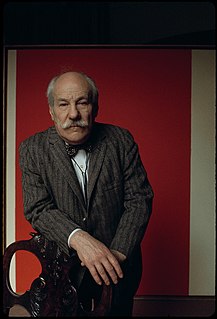A Quote by Saul Alinsky
The very first radical known to man who rebelled against the establishment and did it so effectively that he at least won his own kingdom -- Lucifer.
Related Quotes
Lest we forget at least an over the shoulder acknowledgment to the very first radical: from all our legends, mythology and history (and who is to know where mythology leaves off and history begins - or which is which), the very first radical known to man who rebelled against the establishment and did it so effectively that he at least won his own kingdom - Lucifer.
For Jesus, it is clear, poverty is not the problem; it is the solution. Until human beings learn to live in naked contact and direct simplicity and equality with each other, sharing all resources, there can be no solution to the misery of the human condition and no establishment of God's kingdom. Jesus' radical and paradoxical sense of who could and who could not enter the Kingdom is even more clearly illustrated by his famous praise of children.
Seek first the kingdom of wealth and you'll worry over every dollar. Seek first the kingdom of health and you'll sweat every blemish and bump. Seek first the kingdom of popularity, and you'll relive every conflict. Seek first the kingdom of safety, and you'll jump at every crack of the twig. But seek first His kingdom and you will find it. On that, we can depend and never worry.
I don't think I have rebelled against Latina culture. I have rebelled against those who try to make me warm tortillas for my brothers when they can warm them for themselves, I have rebelled against a patriarchal religion. I rebel against small mindedness in all ways and in every situation but those things are not an intrinsic part of Latina culture and I will fight tooth and nail against anyone who tries to make me feel like I'm less Xicana for not embracing the small-mindedness.
The inner throne of man is both what the kingdom of Christ and the kingdom of Lucifer are after. And when this throne is yielded to the Almighty God, a man enters upon the sacred path of greatness right then and there...The destiny of a human soul depends entirely on who sits upon the throne of that soul...when the flesh is removed from its position of power, the human soul is made ready to usher in the glory of its true and rightful King
Louis XIV was very frank and sincere when he said: I am the State. The modern statist is modest. He says: I am the servant of the State; but, he implies, the State is God. You could revolt against a Bourbon king, and the French did it. This was, of course, a struggle of man against man. But you cannot revolt against the god State and against his humble handy man, the bureaucrat.
He was decisive and wholehearted in everything he did, so intent on the task at hand that he never looked over his shoulder, even if his cloak got caught in a thorny bush. When he did turn to speak to somebody, he used to swing his entire body and address him full face. When he shook hands, he was never the first to withdraw his own. He inspired such confidence that he was known as al-Amin, the Reliable One.
There's a place in the world for the angry young man
With his working class ties and his radical plans
He refuses to bend, he refuses to crawl
He's always at home with his back to the wall
And he's proud of his scars and the battles he's lost
And he struggles and bleeds as he hangs on the cross
And he likes to be known as the angry young man.
Femininity, yes, effectively there is more in The First Man, not only in terms of women but stylistically, in its elements, the notes he wrote. You can see a real love story in it, a childhood love story, [Albert] Camus' first. Meursault [protagonist of The Outsider] and Marie were never up to much really. There is Dora in The Just and others in his plays, but they aren't so well known.
Meanwhile, spiritual submissiveness brings about the wiser use of our time, talents, and gifts as compared with our laboring diligently but conditionally to establish our own righteousness instead of the Lord's (D&C 1:16). After all, Lucifer was willing to work very hard, but conditionally in his own way and for his own purposes.
It is marriage, perhaps, which had given man the best of his freedom, given him his little kingdom of his own within the big kingdom of the state.... It is a true freedom because it is a true fulfilment, for man, woman and children. Do we then want to break marriage? If we do break it, it means we all fall to a far greater extent under the direct sway of the State.





































